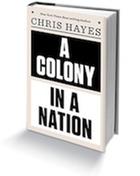
Chris Hayes, author of Twilight of the Elites and host of MSNBC's All In with Chris Hayes, seeks to establish a new framework for understanding America's fractured society with his book A Colony in a Nation. Hayes contends that the country has been divided into two halves that he labels the Colony and the Nation. The idea is adapted from Richard Nixon's 1968 speech at the Republican National Convention, in which he asserted that black Americans "don't want to be a colony in a nation." Hayes argues that almost a half-century later we have created just that:
...we have built a colony in a nation, not in the classic Marxist sense but in the deep sense we can appreciate as a former colony ourselves: A territory that isn't actually free. A place controlled from outside rather than within. A place where the mechanisms of representation don't work enough to give citizens a sense of ownership over their own government. A place where the law is a tool of control rather than a foundation for prosperity.
These views crystallized while Hayes was reporting on the unrest in Ferguson, Mo., after the controversial police shooting of Michael Brown. Peaceful protests, along with incidents of violence and looting, were met with a massive police response that helped to raise questions about police militarization. Hayes asks how "law and order" rhetoric and policies have worked to create aggressively policed islands of poverty (the Colony) practically next door to more affluent, leniently policed havens (the Nation). Ironically enough, Hayes attributes much of the Colony's construction to Nixon, whose dog-whistle rhetoric would eventually merge with the War on Drugs to encourage the explosive growth of American prison populations.
Hayes's argument not only engages with the recent past, however, but goes all the way back to the Founding Fathers. He audaciously compares conditions in our present-day "colonies" to the circumstances that led the American colonies to revolt. Famous revolutionaries like John Hancock were forced into smuggling and black market profiteering by the British government's mercantilist policies. They were, in other words, criminals, and overreaching attempts to crack down on their illicit activities helped provide the spark for war. Hayes compares smuggling to the drug trade in the modern-day Colony: "Sure, the drug trade is illegal, reckless, and destructive, but it encourages commerce in places where the legitimate economy produces few jobs."
Hayes extends his comparison further, arguing that British attempts to crack down on smuggling and collect taxes "essentially inaugurated America's first tough-on-crime era." He compares constant British harassment to the NYPD's infamous "stop and frisk" practices and to the "writs of assistance" that let British officials invade American homes to the humiliating privacy intrusions that often characterize life in the Colony. Hayes's purpose is not only to thumb his nose at "law and order" advocates who tend to wrap themselves in the flag, but also to point out how exploitative colonial relationships have been adapted and imported into the 21st century.
A Colony in a Nation is not primarily a history lesson, though it does provide a serious, empathetic look at the problems facing the Colony, as well as at the police officers tasked with making rapid decisions in a gun-rich environment. Hayes takes us through his less-than-successful experience putting himself in the latter's shoes by trying out an unusual training tool, a virtually reality simulator: "We're only one scene in, and already the self-righteous liberal pundit has drawn his weapon on an unarmed man holding a cinder block." Elsewhere, Hayes examines his own experiences with the law, such as an incident when he was almost caught accidentally smuggling "about thirty dollars' worth of marijuana stuffed into my eyeglass case" into the 2000 Republican National Convention. Hayes got away without so much as a slap on the wrist, protected by luck, circumstances and privilege. For black men living in the Colony, encounters with the police are much more fraught. Racial profiling and minor infractions can lead to "being swept into the vortex of a penal system that captures more than half the black men his age in his neighborhood... an adulthood marked by prison, probation, and dismal job prospects...."
Hayes aims to show not just that the law is unequally applied, but that the Nation and the Colony have two entirely different justice systems. He points to colleges and universities as a key example: "All these schools and hundreds of others draw their student bodies disproportionately from upper echelons of society, and they are places where parents and administrators outright expect students to engage in illicit behaviors." Why aren't poorer neighborhoods extended the same "extremely liberal norms of tolerance"? In fact, under the widely celebrated "Broken Windows" theory of policing in the 1990s, New York "constructed an entire new judicial system around low-level offenses" where the goal was "not to figure out if the person in question committed a crime but to sort city residents according to their obedience and orderliness." The benefits for the Nation were manifest and the practices were almost immediately exported to cities all over the country. Cleaned-up cities came at a cost, though, vacuuming huge numbers of poor, mentally ill and minority-status Americans into prisons and inflicting "widespread harassment and misery" on residents of the Colony.
Hayes does not propose solutions in A Colony in a Nation. Instead, he makes a powerful dichotomy visible to those who can't see it. His framework serves as a powerful lens through which to understand the last half-century of American history, as well as the immense challenges going forward. --Hank Stephenson

